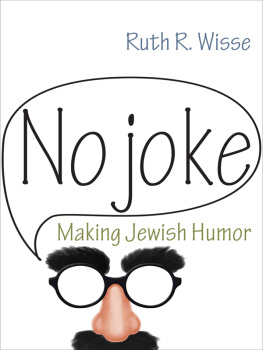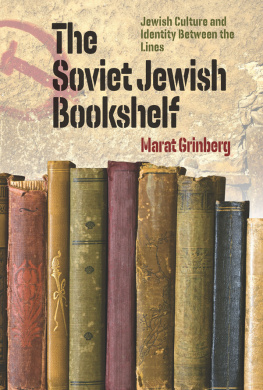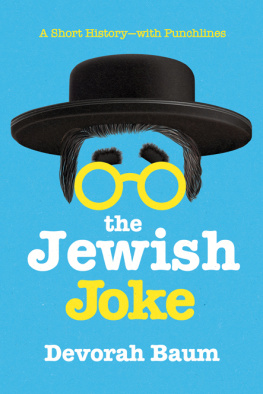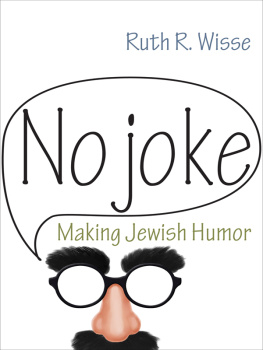
No Joke
LIBRARY OF JEWISH IDEAS
Cosponsored by the Tikvah Fund
The series presents engaging and authoritative treatments of core Jewish concepts in a form appealing to general readers who are curious about Jewish treatments of key areas of human thought and experience.
No Joke
Making Jewish Humor Ruth R. Wisse
PRINCETON UNIVERSITY PRESS
Princeton and Oxford
Copyright 2013 by Princeton University Press
Published by Princeton University Press, 41 William Street,
Princeton, New Jersey 08540
In the United Kingdom: Princeton University Press, 6 Oxford Street,
Woodstock, Oxfordshire OX20 1TW
press.princeton.edu
All Rights Reserved
Library of Congress Cataloging-in-Publication Data
Wisse, Ruth R., author.
No joke : making Jewish humor / Ruth R. Wisse.
pages cm. (Library of Jewish ideas)
Includes bibliographical references and index.
ISBN 978-0-691-14946-2 (alk. paper)
1. Jewish wit and humorHistory and criticism. 2. JewsHumorHistory and criticism. I. Title.
PN6149.J4W49 2013
809.798924-dc23 2012051631
British Library Cataloging-in-Publication Data is available
Publication of this book has been aided by the Tikvah Fund
This book has been composed in Garamond Premiere and Tekton
Printed on acid-free paper.
Printed in the United States of America
10 9 8 7 6 5 4 3 2 1
For my grandchildren
Contents
Illustrations
No Joke
Introduction
The Best Medicine
One morning, in Harvards Semitic Museum where the Jewish Studies program is housed, I ran into two of my colleagues collecting their mail. The evening before, when I had lectured at a synagogue, a member of the audience had told me a good joke. I couldnt wait to share it:
Four Europeans go hiking together and get terribly lost. First they run out of food, then out of water.
Im so thirsty, says the Englishman. I must have tea!
Im so thirsty, says the Frenchman. I must have wine.
Im so thirsty, says the German. I must have beer.
Im so thirsty, says the Jew. I must have diabetes.
The joke was brand new when I told it that morningthough it is by now well worn, at least in part because I put it into circulation in published and recorded talks about Jewish humor. If you are into such things, you will appreciate my thrill at the laughter that greeted the punch line. How often do you get to tell Jews a joke that they havent heard before?
But as I was about to follow my colleagues out of the front office, the receptionist, who had overheard our conversation, told me that she found the joke offensive. Indeed, if we werent Jews, she said, she would have called it anti-Semitic. Could I please explain what was funny about it and account for our hilarity?
This young woman, let me call her Samantha, was dating a Jewish student in our department, and as a Gentile, had previously asked me about unfamiliar terms and concepts in the novels of Isaac Bashevis Singer. Hence I took my time in reassuring her that stereotypes are a regular feature of joking, which depends for its effect on brevity. With no time for elucidation, jokes often designate people by a single characteristic. Is it fair that Poles or Newfies (Newfoundlanders) get labeled as dumb? Are all Scots stingy? Are all mothers-in-law hateful? Because compression of this kind is essential to the genre, a single national association represents each of the hikers in the joke, and whichever of them was placed last in a serial buildup would invariably be at variance with the others. As the last of the four, the Jew was expected to say something different.
But this did not yet seem to get to the heart of the matter, so I continued: The joke turns on the double meaning of the verb to have: (a) to possess, as in, to have a drink, and (b) to be afflicted by or have a disease. Repetition of the first usage by the Englishman, the Frenchman, and the German raises the expectation that the verb will continue to be used in the same way. When the Jew breaks the pattern, we laugh at the displacement of one anxiety (thirst) by a graver one (illness); Sigmund Freud provides a superb analysis of this technique in Jokes and Their Relation to the Unconscious. While the three hikers react to the problem at hand, the Jew anticipates its direst implications. The three want to quench their thirst, and he looks for complications behind the presumably obvious cause. Is he neurotic? A hypochondriac? Why is he conditioned for disaster? The joke may know what happened to the Jews of Europe and may assume that a Jew in European company is entitled to worry about his prospects of survival.
Forced in this way to think about the joke, I realized how it replicated the Jews anxiety. A Jew in mixed European company introduces an additional level of insecurity beyond the one involved in the hike. Many times I had stood in that very building with those same colleagues discussing a recent suicide bombing in Israel or trading stories about our relatives in some hostile climate. The Jewish hikers exaggerated worry made us laugh at a truth so ingeniously exposed. The joke organized our analogous concern and then exploded it to our surprised satisfaction.
I confess that my first impulse when Samantha asked me to explain the joke had been to tell her the famous one that introduces a collection of Yiddish humor by the folklorist Immanuel Olsvanger:
When you tell a joke to a peasant, he laughs three times, once when you tell it to him, the second time when you explain it to him, and the third time when he understands it.
The landowner laughs twice. Once when you tell it to him and again when you explain it, because he never understands it.
The policeman laughs only once when you tell it to him, because he doesnt let you explain it so he never understands it.
When you tell a Jew a joke, he says, Ive heard it before. And I can tell it better.
This joke ridicules those who dont get Jewish humor, in a pecking order of wit that is dominated by Jews to such a degree that their only competition is among themselves. Failure to laugh at a joke signifies something like dimness in the peasant, remoteness in the landowner, and severity in the police officer. The slowest to laugh is the most threatening, and the one who laughs soonest is the most human. If the Jew fails to laugh, it is not, God forbid, because he missed the point of the joke but because he has exhausted the fund of laughter. The joke uses humor as a touchstone of humanity, consigning those who lack it to some lower existence, but implying that Jews are almost too human for their own good.
Naturally, I didnt tell Sam this joke because it might have expanded the distance between us that we were trying to shrink. The Olsvanger joke, if I may call it that, assumes an adversarial relation between Gentiles and Jews. It suited European societies where Christian peasants, landowners, and police were often hostile to Jews; intended solely for those who spoke the Jewish language, it was told elsewhere in Europe about an Englishman, a Frenchman, and a German. The antagonism of surrounding European societies made Jews eager for the only kind of payback they could afford to indulge. But as far as I know, the joke has no U.S. equivalent. Who would be its foils? Blacks, Hispanics, and WASPs? A bank teller, manager, and president? There may be plenty of ethnic and racial joking in the United States, and some anti-Jewish bigotry behind it, but nowadays East and West Coast Americans seem so familiar with Jewish comedy that I was frankly surprised Samantha did not join in our laughter. Had I thought the joke excluded her, I might not have told it in that semipublic space.
Next page










